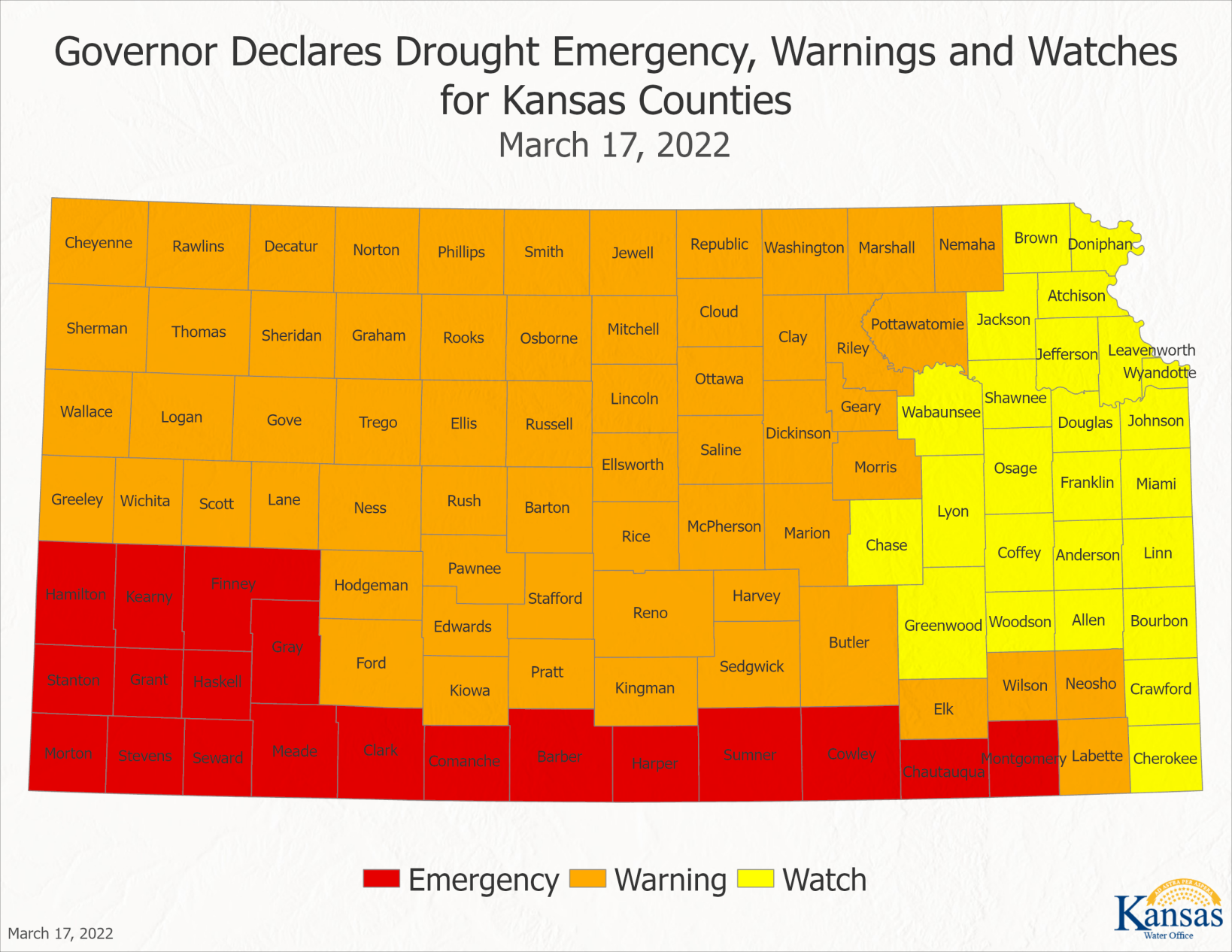Gov. Laura Kelly approved updated drought declarations for Kansas counties with Executive Order #22-03. This drought declaration places all 105 Kansas counties either in watch, warning or emergency status.
“The majority of the state of Kansas has experienced drought or abnormally dry conditions for the past several months,” said Governor Kelly. “Unfortunately, these conditions are forecast to persist or get worse, so I strongly encourage Kansans to be mindful of drought conditions and work to minimize the threat of fires across the state.”
The drought declaration placed 19 counties into an emergency status, 61 counties in a warning status and 25 into a watch status. This action was recommended by Connie Owen, Director of the Kansas Water Office and Chair of the Governor’s Drought Response Team. Kansas has continued to experience drier than normal conditions all across the state. Most areas have a departure from normal precipitation of more than three inches over the last six months.
“We have watched drought conditions continue to get worse since this past fall or longer in some areas, causing concern with groundwater supplies, reservoirs, stream flow, crop production, elevated wildfire risk and more,” said Owen. “The Governor’s Drought Response Team will continue to monitor the situation and make recommendations to the Governor as necessary, as future outlooks call for drought conditions to persist as we enter spring.”
Through an interagency agreement between the Kansas Water Office, Kansas Department of Wildlife and Parks and Kansas Division of Emergency Management, counties in emergency stage are eligible for emergency use of water from certain state fishing lakes. These counties also become eligible for water in some Federal reservoirs.
Individuals and communities need to contact the Kansas Water Office for a water supply request prior to any withdrawals from lakes. These requests will in turn be referred to the appropriate office to obtain necessary permits to withdraw requested water.
This Executive Order shall remain in effect for those counties so identified until rescinded by Executive Order or superseded by a subsequent Executive Order revising the drought stage status of the affected counties.
Effective immediately, Executive Order #22-03:
-
Declares a Drought Emergency, Warning or Drought Watch for the counties as identified below;
-
Authorizes and direct all agencies under the jurisdiction of the Governor to implement the appropriate watch, warning or emergency level-drought response actions assigned in the Operations Plan of the Governor’s Drought Response Team.
The Governor’s Drought Response Team will continue to watch the situation closely and work to minimize the effects drought has on Kansans.
For more detailed information about current conditions, see the Kansas Climate Summary and Drought Report on the Kansas Water Office website at kwo.ks.gov.
County Drought Stage Declarations
Drought Emergency: Barber, Chautauqua, Clark, Comanche, Cowley, Finney, Grant, Gray, Hamilton, Harper, Haskell, Kearny, Meade, Montgomery, Morton, Seward, Stanton, Stevens, Sumner
Drought Warning: Barton, Butler, Cheyenne, Clay, Cloud, Decatur, Dickinson, Edwards, Elk, Ellis, Ellsworth, Ford, Geary, Gove, Graham, Greeley, Harvey, Hodgeman, Jewell, Kingman, Kiowa, Labette, Lane, Lincoln, Logan, Marion, Marshall, McPherson, Mitchell, Morris, Nemaha, Neosho, Ness, Norton, Osborne, Ottawa, Pawnee, Phillips, Pottawatomie, Pratt, Rawlins, Reno, Republic, Rice, Riley, Rooks, Rush, Russell, Saline, Scott, Sedgwick, Sheridan, Sherman, Smith, Stafford, Thomas, Trego, Wallace, Washington, Wichita, Wilson
Drought Watch: Allen, Anderson, Atchison, Bourbon, Brown, Chase, Cherokee, Coffey, Crawford, Doniphan, Douglas, Franklin, Greenwood, Jackson, Jefferson, Johnson, Leavenworth, Linn, Lyon, Miami, Osage, Shawnee, Wabaunsee, Woodson, Wyandotte



